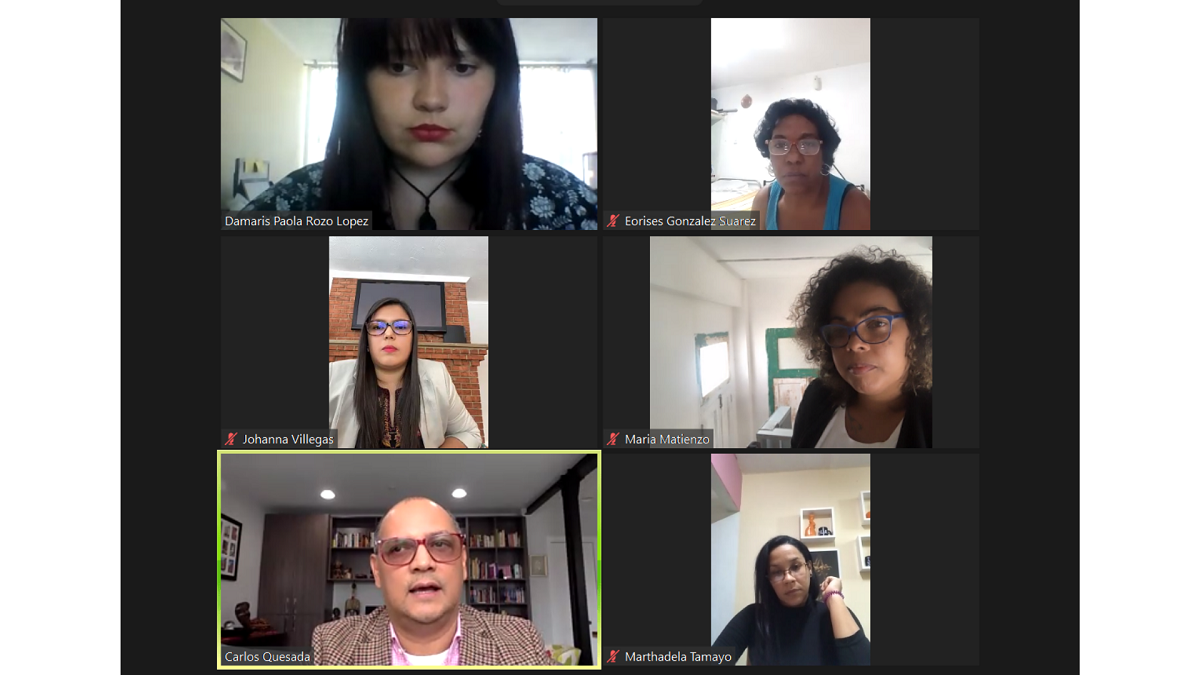Six years after the adoption of the Sustainable Development Goals (SDGs), Cuban women demand a comprehensive law on violence against women
Washington, D.C. February 4th, 2021.– The International Institute on Race, Equality and Human Rights (Race and Equality) held a webinar on Wednesday, February 3rd to discuss women’s and girls’ rights in Cuba with representatives of independent Cuban civil society. The webinar also marked the official launch of the report Cuban Women: Left Out of the […]

Washington, D.C. February 4th, 2021.– The International Institute on Race, Equality and Human Rights (Race and Equality) held a webinar on Wednesday, February 3rd to discuss women’s and girls’ rights in Cuba with representatives of independent Cuban civil society. The webinar also marked the official launch of the report Cuban Women: Left Out of the 2030 Agenda.
The webinar, entitled “Cuba and the 2030 Agenda: Progress on SDG 5 on gender equality and empowerment of women and girls,” featured Damaris Rozo López, director of the Regional SDG Observatory at University of the Andes in Colombia; María Matienzo, a Cuban journalist and writer who authored the report; Marthadela Tamayo, a human rights defender and member of the Citizens’ Committee for Racial Integration (CIR); and Eroisis González, coordinator of the Cuban organization Women’s Platform (Plataforma Femenina).
Johanna Villegas, Legal Program Officer at Race and Equality, served as the moderator, while Executive Director Carlos Quesada offered opening and closing remarks. Carlos remarked that SDG 5 aims to end discrimination and violence against women and girls, give proper recognition to gendered labor, improve women’s participation in public life, ensure access to reproductive health, and provide women with equal access to economic resources and opportunities.
Leaving No One Behind
In her remarks, Damaris Rozo López explained that one of the most important principles of the 2030 Agenda, the vision for sustainable development for which the SDGs provide the roadmap, is the commitment to “leave no one behind.” This commitment requires an intersectional approach to sustainable development, with particular attention devoted to the circumstances of vulnerable groups of women, including Afro-descendant, LGBTI, and indigenous women.
Damaris warned that Latin America and the Caribbean face serious headwinds in achieving the SDGs. The Observatory’s data indicates that the region is not on track to achieve the goals by 2030, and at its current pace would not even achieve them in the next 50 years. Damaris explained that although COVID-19 has posed an unprecedented challenge, “We may be lagging, but we cannot stay still. I encourage all of civil society to pressure their States to achieve the Sustainable Development Goals.”
The Situation in Cuba
In her intervention, Maria Matienzo summarized her report Cuban Women: Left Out of the 2030 Agenda, which uses documentation of human rights violations and first-hand testimonies to analyze Cuban women’s experiences with the country’s sustainable development process. “In Cuba,” she concluded, “there exists a pattern of violence against women that has repeated itself over many years, demonstrating a failure to achieve SDG 5.”
Maria emphasized two key points. First, the lack of a juridical framework ensuring protection and equality for women, particularly the lack of a comprehensive law on violence against women that defines femicide as a crime. “In November 2019,” she explained, “a group of 40 activists, all women, presented a model law on violence against women to the National Assembly, but they were ignored.”
Second, she pointed to a clear pattern of criminalization against women’s rights activists. An environment of constant violence faces these activists, with assaults, arrests, and threats documented throughout 2020. The case of journalist Camila Acosta, who has been evicted from several rental homes due to security forces’ pressure on her landlords and who was arbitrarily detained while attempting to report on the peaceful protests of January 27th, is emblematic.
Marthadela Tamayo and Eroises González, both Afro-Cuban women, described the compounded forms of violence and discrimination facing Afro-Cubans who advocate for human rights and sustainable development. The activists described racialized abuse at the hands of police or State Security. Marthadela remarked that Cuban officials often insist, “you should be grateful, because the Revolution made you [Afro-Cubans] fully human.” Eroises also stated that the COVID-19 pandemic has fallen the hardest on Afro-Cuban women, especially those who do not live in the capital of Havana.
Cuban Women’s Demands
All three activists agreed that the Cuban government must produce trustworthy and accessible data on the situation of Cuban women and girls. They also demanded legal reforms to ensure gender equality and to protect women from violence, including a specific measure to criminalize femicide. According to statistics from the initiative Cuba I Believe You, 32 women, 2 of them underaged, were killed in Cuba in 2020. The Cuban Women’s Network documented 4
more killings in January of this year.
Race and Equality is committed to supporting the demands of independent civil society in Cuba, including the demands for gender equality, for an end to violence against women, and for an end to gender-based discrimination. We call upon the Cuban State to fulfill its international obligations by listening to the voices of women’s rights activists and following their recommendations to take all necessary steps to build a free and equal society.
Read and download the report Cuban Women: Left Out of the 2030 Agenda (Spanish) here
Watch the webinar here

